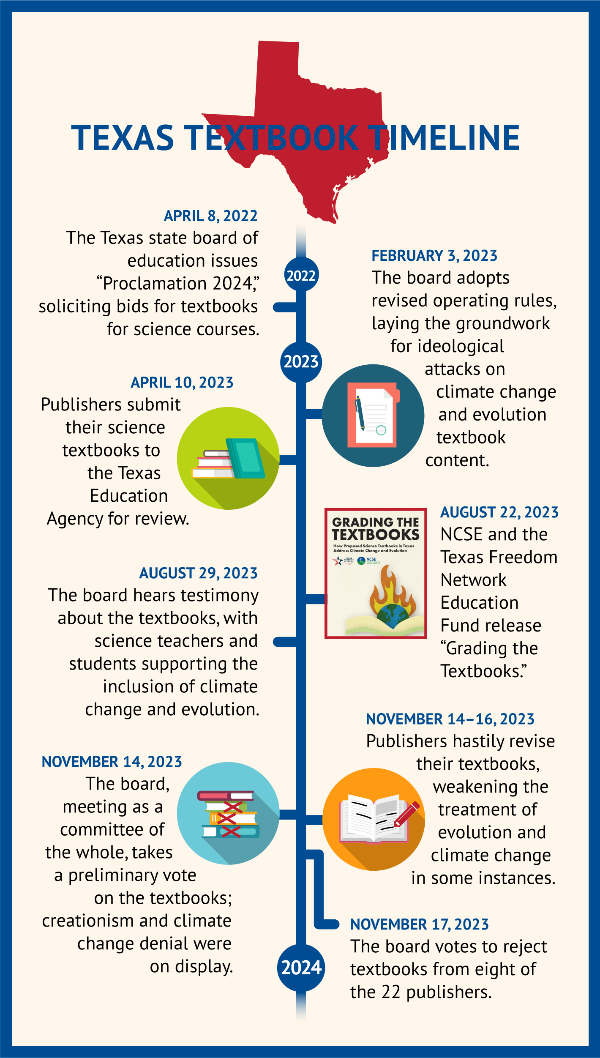Everything’s bigger in Texas, including ideological attacks on science textbooks
Some Texas Board of Education members were "clearly motivated" to remove textbooks from an approved list because of their personal and ideological beliefs regarding evolution and climate change.

With over 5.5 million students enrolled in its public schools, Texas is a huge market for science textbooks. But the textbook adoption process, conducted at the state level, tends to be highly contentious, thanks to a powerful faction on the elected, and highly politicized, state board of education. In the most recent round of textbook adoption, in 2023, textbooks were attacked on account of their treatment of both climate change and evolution—with results that unfortunately help to undermine the integrity of science education in the Lone Star State.
Laying the groundwork
Members of the board began to lay the groundwork for the attack in February 2023, when they adopted changes to its operating rules. Among these were a requirement that instructional materials "present positive aspects of the United States and its heritage and abundant natural resources." Pat Hardy, a member of the board, told E&E News, "If they’re going to tout how wonderful the alternative climate change stuff is, then they need to also say all the things that are not good about it and not just hit on the fossil fuel industry." She added, "Our schools are paid for by the fossil fuel industry for the most part."
 Also included in the changes were a requirement of the recognition of "the ongoing process of scientific discovery and change over time in the natural world," and language requiring instructional materials to “present factual information, avoid bias, and encourage discussion.” While ostensibly neutral, it seemed likely that these would be deployed selectively against areas of science doubted by the board. As if to provide evidence, at a meeting of the board, Hardy specifically endorsed teaching “both sides” of climate science in order to "avoid bias."
Also included in the changes were a requirement of the recognition of "the ongoing process of scientific discovery and change over time in the natural world," and language requiring instructional materials to “present factual information, avoid bias, and encourage discussion.” While ostensibly neutral, it seemed likely that these would be deployed selectively against areas of science doubted by the board. As if to provide evidence, at a meeting of the board, Hardy specifically endorsed teaching “both sides” of climate science in order to "avoid bias."
As for the source of the changes, Hardy told E&E News "that she worked on the changes with the Texas Energy Council, a coalition of oil and gas companies, as well as newly elected board member Aaron Kinsey, CEO of American Patrols, an aviation oil-field services company. The goal of the group was to eliminate ‘textbooks written by people not from Texas who have a negative view of fossil fuels and a positive view of electric cars.'" A further connection between the fossil fuel industry and the board is provided by board member Will Hickman, a lawyer for Shell Oil.
Anticipating the critics
Anticipating a flood of specious criticisms of the textbooks from the board, NCSE and the Texas Freedom Network Education Fund assembled a panel of scientists and educators to evaluate the textbooks submitted for state adoption especially with regard to their treatment of evolution and climate change. "Grading the Textbooks: How Proposed Science Textbooks in Texas Address Climate Change and Evolution," a report of the study, was released in August 2023, receiving coverage in the Texas press, including the San Antonio Express-News and the Texas Tribune.
The executive summary of "Grading the Textbooks" explained, "[R]eviews by a panel of experts show that the treatment of climate change and evolution in nearly all of these materials conforms to the state science standards and rules adopted by the board. Where the reviews reveal weaknesses in coverage of the two topics, those deficiencies appear to be largely a consequence of inadequate state standards." "Grading the Textbook" observed that Texas’s standards received the grade of F in "Making the Grade?" for their treatment of climate change and for their treatment of evolution in different studies.
"Grading the Textbooks" concluded, "In short, the findings in this report argue against the rejection of nearly all of these textbooks based on false claims that they fail to meet state standards or other rules set out by the state board (such as requiring factual accuracy, avoidance of bias, and encouragement of inquiry) on the topics of climate change and evolution. Texas parents and other residents who want our children to learn science accurately, honestly, and thoroughly should be wary of objections to textbooks for teaching the truth on these two important topics."
A hearing on the textbooks and the lobbyists mobilize
On August 29, 2023, the board heard testimony on the textbooks, with members of the board reiterating their positions. Will Hickman "indicated that he'd advocate for instructional materials that do not include climate change solutions in science courses," according to the Texas Tribune, and asked one testifier if textbooks should include "the benefits we get from burning carbon." His colleague Marisa Perez-Diaz, however, told the Texas Tribune, "We absolutely should say humans do impact climate change," adding, "It doesn’t have to be political — it is just fact."
In the wake of the hearing, climate change deniers mobilized to lobby the board.
In the wake of the hearing, climate change deniers mobilized to lobby the board. August Pfluger, a Republican member of Congress representing District 11, in the oil-field-rich Permian Basin of Texas, complained on Facebook that "We cannot allow the radical climate lobby to infiltrate Texas middle schools and brainwash our children." Among the commenters on his post was LJ Francis, a member of the board. Later, Texas Railroad Commissioner Wayne Christian sent the board a letter expressing his concern about "potential textbooks that could promote a radical environmentalist agenda."
Creationists followed. In early November 2023, Texas Values issued a press release explaining, "When it comes to Science classes and instructional materials, Texas Values has traditionally fought to make sure that Creationism ... is given just as much attention as the theories of Evolution, and the Big Bang Theory," and criticizing textbooks for presenting evolution and the Big Bang without any mention of supposed alternatives. Of particular concern was "the theory of humans evolving from monkeys" (emphasis in original) — which of course none of the textbooks present as scientifically credible.
The committee of the whole
Despite the findings of "Grading the Textbooks," journalist Katie Worth's analysis (see below), and the state’s own review, the textbooks submitted for adoption met with a hostile reception at a committee of the whole meeting held on November 14, 2023. Creationism and climate change denial were on display as various members of the board criticized the textbooks for not including alternative views on the Big Bang, the origin of life, evolution (to which creationism was explicitly mentioned as a supposed alternative, though it is unconstitutional to teach creationism in the public schools), and climate change.
Worth weighs in
The journalist Katie Worth, the author of Miseducation: How Climate Change Is Taught in America (2021), conducted her own analysis of the grade 8 science textbooks submitted by the three largest publishers. Writing in Scientific American in October 2023, she reported that "the proposed new textbooks include much more robust information about the climate crisis than their earlier editions did. In some cases, however, the books appear to cloud the human causes of the crisis." Gratifyingly, Worth’s article quoted NCSE staff and cited NCSE’s research.
The committee voted to remove textbooks from Accelerated Learning, Discovery Education, EduSmart, Green Ninja, and McGraw-Hill from the list of approved textbooks after discussions in which evolution and/or climate change was misrepresented as scientifically controversial. Similarly targeted, but surviving the committee’s vote, were two textbooks from Savvas. The committee also voted to remove textbooks from seven other publishers from the list of approved textbooks without registering any explicit objections to their treatment of evolution and/or climate change.
NCSE's Deputy Director Glenn Branch was quoted by the Guardian as saying, "Members of the board are clearly motivated to take some of these textbooks off of the approved list because of their personal and ideological beliefs regarding evolution and climate change." Evidently agreeing with Branch's diagnosis, the National Science Teaching Association urged members of the board, in a letter sent before its November 17 meeting, not to "allow misguided objections to evolution and climate change impede the adoption of science textbooks in Texas," as the Associated Press reported.
The board’s final vote
The board finalized the list of science textbooks approved for use in the state’s public schools at its November 17, 2023, meeting. By then the majority of textbooks had been hastily revised in response to the criticisms from members of the board, sometimes in such a way as to elicit concern. McGraw-Hill removed a number of diagrams illustrating the evolutionary lineage of humans from its high school biology textbook, for example, while Discovery Education removed a reference to fossil fuel use contributing to the greenhouse effect in its Grade 6 textbook.
Citing the revisions by the publishers, the board reversed the committee of the whole’s previous decisions with respect to the Accelerated Learning and McGraw-Hill Biology textbooks. Motions to restore the Discovery Education, EduSmart, and Green Ninja textbooks to the approved list were defeated, however, with evolution and/or climate change again misrepresented by members of the board as scientifically controversial. Ultimately, textbooks from eight of the 22 publishers submitting textbooks for approval were rejected.
Reaction was harsh. "An embarrassment-free approval of science textbooks would have been nice, but the real tragedy will come when our kids open those censored textbooks. We owe them a better education and a brighter future," lamented a columnist for the Houston Chronicle, while the San Antonio Express-News editorialized, "Hyper-partisanship that interferes with the education of Texas students, and their understanding of the world, was again on display last week ... It’s painfully obvious that the SBOE’s opposition to seven of the 12 proposed [grade 8] science textbooks was due to politics and religion."
Impact on students
Selection of textbooks is in the hands of local districts, but as a result of the board’s decisions, which were neither scientifically nor pedagogically warranted, their choices are now more limited than they should have been, and the education of the students they serve may suffer as a result. "It’s certainly still possible for Texas’[s] students to get a sound scientific education in general and in regard to [evolution] and climate [change]," NCSE's Branch told the Austin American-Statesman. "It’s just going to be [in spite] of the Texas State Board of Education."
See all of NCSE’s coverage of events in Texas.







